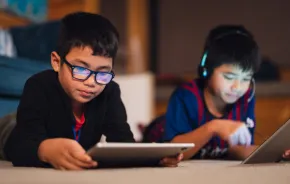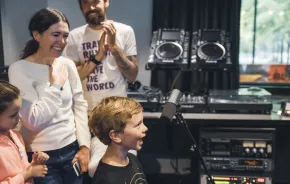Awesome Books That Celebrate Summer Adventures

Enjoy nature’s bounty with berry picking and gardening
The gorgeousness of a Pacific Northwest summer makes up for the many months of rain. A small backyard garden can yield a lot of produce, and studies have shown that kids are more likely to try vegetables they’ve had a hand in growing. Even if you have a black thumb, our region is blessed with U-pick farms offering every berry you’ve ever craved and a few you might not have heard of. Arlington’s Biringer Farm is a longtime family favorite, but don’t overlook the other options. Remlinger Farms, in Carnation, pairs berry picking with a family fun park, while Henna Blueberry Farm, in Fall City, is a likely place for spotting wildlife. Whether you just want an afternoon in the berry fields or you’re trying to grow a gardener this summer, consider these books your green allies.
Picture Books:
 For berry-picking adventures, you can’t do better than Robert McCloskey’s classic “Blueberries for Sal.” This simple story of mothers and children — both human and ursine — harvesting berries in preparation for winter is delightful no matter how old you are. “Wild Berries,” by Vancouver-based indigenous author Julie Flett, tells the story of a young Cree boy who picks wild berries in the forest with his grandmother. Along the way, they observe wildlife and learn the Cree names for things. Kids will be excited to try the accompanying wild blueberry jam recipe. In author Paul Fleischman’s “Seedfolks,” a Vietnamese girl plants six lima beans in a vacant lot in Cleveland. Along with her beans, she grows a community, as diverse neighbors become friends and an empty lot becomes a garden.
For berry-picking adventures, you can’t do better than Robert McCloskey’s classic “Blueberries for Sal.” This simple story of mothers and children — both human and ursine — harvesting berries in preparation for winter is delightful no matter how old you are. “Wild Berries,” by Vancouver-based indigenous author Julie Flett, tells the story of a young Cree boy who picks wild berries in the forest with his grandmother. Along the way, they observe wildlife and learn the Cree names for things. Kids will be excited to try the accompanying wild blueberry jam recipe. In author Paul Fleischman’s “Seedfolks,” a Vietnamese girl plants six lima beans in a vacant lot in Cleveland. Along with her beans, she grows a community, as diverse neighbors become friends and an empty lot becomes a garden.
Middle Grade:
 School-age kids probably won’t need any prompting to pick berries, but Frances Hodgson Burnett’s classic “The Secret Garden” established a century ago that forbidden gardens are more appealing than the ones your parents put you to work in. Northwest author Sandra Smith updates the concept in “Seed Savers: Treasure,” the first book in a dystopian series about a world in which growing your own food is illegal. In Holly Goldberg Sloan’s “Counting by 7s,” biracial genius Willow is obsessed with numbers and her garden, but when she enters the foster-care system, she needs to learn how to connect with people. “Black Gold” by another local author, Sara Cassidy, is the third in a series about Rudy and Cyrus. The boys previously resisted moving to a farm, but in this installment, they graduate from fruit-stand managers to worm moguls when a neighbor drops off a bin full of composting worms. Looking for a more direct connection between reading and action? “Gardening Lab for Kids: 52 Fun Experiments to Learn, Grow, Harvest, Make, Play, and Enjoy Your Garden” by Renata Brown contains just what it states on the cover.
School-age kids probably won’t need any prompting to pick berries, but Frances Hodgson Burnett’s classic “The Secret Garden” established a century ago that forbidden gardens are more appealing than the ones your parents put you to work in. Northwest author Sandra Smith updates the concept in “Seed Savers: Treasure,” the first book in a dystopian series about a world in which growing your own food is illegal. In Holly Goldberg Sloan’s “Counting by 7s,” biracial genius Willow is obsessed with numbers and her garden, but when she enters the foster-care system, she needs to learn how to connect with people. “Black Gold” by another local author, Sara Cassidy, is the third in a series about Rudy and Cyrus. The boys previously resisted moving to a farm, but in this installment, they graduate from fruit-stand managers to worm moguls when a neighbor drops off a bin full of composting worms. Looking for a more direct connection between reading and action? “Gardening Lab for Kids: 52 Fun Experiments to Learn, Grow, Harvest, Make, Play, and Enjoy Your Garden” by Renata Brown contains just what it states on the cover.
Young Adult:
 In Gary Paulsen’s “Notes From the Dog,” which skews to the younger side of YA, lonely 15-year-old Finn and his dog befriend a woman battling cancer. While Finn’s attempts to take care of her garden don’t always work, he does learn how to care for people. For a nonfiction approach, Michael Pollan’s “The Omnivore’s Dilemma: Young Readers Edition” encourages kids to consider the personal and global health implications of their food choices, and might encourage your teen to grow their own.
In Gary Paulsen’s “Notes From the Dog,” which skews to the younger side of YA, lonely 15-year-old Finn and his dog befriend a woman battling cancer. While Finn’s attempts to take care of her garden don’t always work, he does learn how to care for people. For a nonfiction approach, Michael Pollan’s “The Omnivore’s Dilemma: Young Readers Edition” encourages kids to consider the personal and global health implications of their food choices, and might encourage your teen to grow their own.
If neither reason nor drama can pique your teen’s interest in growing things, they will probably enjoy author Stella Gibbons’ 1932 classic satire “Cold Comfort Farm,” in which an urbane young woman descends upon her hapless and depressing farmer relatives and proves she really does know better than her elders.











